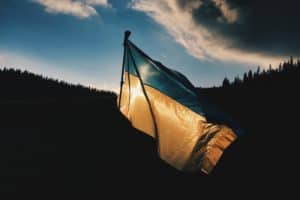LOCK HAVEN, Pa., (BRN) – Looking at pictures of Ukrainian streets littered with bomb-stricken buildings and remnants of crumbling homes, Alina Pislar can’t help but be reminded of a time less destructive: peaceful summers and sweet moments spent with her family in Ukraine.
“I mean, it kind of just broke my heart because of the fact that, you know, Ukraine has just meant a lot to me. I’ve spent three of my summers of my childhood in Ukraine,” shared Pislar.
“So, just looking at pictures of bombings or videos of bombings in Kyiv, … I remember walking those streets 12 years ago [and] eating McDonald’s there.”
Pislar, a current member of Big Woods Bible Church and former member of Lock Haven University’s NewLife college ministry, was born in California, but all of her immediate family – parents, brothers, aunts and cousins – were born in Ukraine.
Most of her family is from the southern region of Ukraine, specifically the Izmail area, and are still living there. She also has family living in Odessa and outside of Kyiv.
“My aunt in Kyiv was forced to evacuate the city and is now in a nearby village, but still in the outskirts of Kyiv. She has been, probably, most significantly impacted by this [invasion],” said Pislar.
To her, and most of her family, Russia’s invasion into Ukraine was a shock.
“People weren’t really expecting Russia to actually invade Ukraine. They heard rumors about it, but didn’t really think it’d be this bad. So, I think that a lot of people were very shocked and just really heartbroken.”
Pislar continued: “I think the hardest part to kind of stomach is that Ukraine wasn’t invaded by some random country, it was invaded by Russia. Living in the United States, a lot of Slavic churches are composed of people who speak Russian, but come from different countries. So, just growing up in this kind of friendly environment [and] then seeing people from Russia invading and fighting against Ukraine…it just hurts to see.”
At the start of the invasion, some of Pislar’s cousins and their children fled to Moldova and then to Romania, but their husbands are still in Ukraine as they were not allowed to cross the border.

Denis Sichkar, pastor of First Ukrainian Evangelical Baptist Church in Philadelphia, echoed Pislar’s concern as his entire congregation, including himself, have family in Ukraine.
“I can’t think of anybody that doesn’t have any family over there,” said Sichkar. “Most of our congregations are first generation immigrants, like even my generation are folks that were born in Ukraine and moved here.”
Sichkar went on to share that many members of his church and other Ukrainian congregations have siblings, cousins and close loved ones that have been directly impacted by the invasion.
“It’s either they are spending nights in the basement, kind of anticipating air attacks, or they have been displaced [and] they’ve had to move. So, those families that live closest to the east, closest to the capitol – Kyiv – those families had to be relocated and moved from their homes,” said Sichkar.
In order to help those fleeing from their homes, Send Relief, the compassion ministry arm of the North American Mission Board (NAMB), has partnered with the International Mission Board (IMB) to put boots on the ground at the Ukraine-Poland boarder. Relief workers are helping Ukrainian refugees by providing shelter, clothing and food.
Locally, at the state level, the Baptist Resource Network of Pennsylvania and South Jersey is working alongside the Ukrainian Baptist Convention (UBC) in Philadelphia to raise awareness and aid refugees moving into the Pennsylvania and South Jersey region.
Pennsylvania, alone, is home to more than 122,000 Ukrainians, which is the second highest Ukrainian population in the nation, just behind New York. New Jersey, not far behind, is home to nearly 74,000 Ukrainians, the fourth highest Ukrainian population in the States.
Both Sichkar and Pislar expressed that the best way to care for our Ukrainian neighbors, near and far, is through prayer.
“I would just say that prayer is really the biggest thing that you could do, because you’re appealing to the God of the universe to reach down and intervene,” said Pislar.
Pastor Sichkar recommended the following prayer points for the Ukraine crisis:
- Pray for those in government: “The Bible calls us to pray for those in government, those that are rulers. So, we pray, both from the side of Russia – that those that are making decisions, that their hearts are softened [and] that they may turn from their decision to attack the Ukrainian people. Then we’re also praying for those in Ukraine…so, we pray that both repent [and] seek counsel from God.”
- Pray for God to miraculously intervene: “Whether it’s through weather or through some sort of unordinary means, just show His presence in the defense of Ukraine, because we know that He would be glorified through those kinds of circumstances. So, we’re asking for God to strengthen the Ukrainian army [and] to strengthen the underdog.”
- Pray for those who are not Christ followers: “We also pray that those [who] are not Christian right now are able to feel His presence in a supernatural way and, ultimately, glorify God through these circumstances.”
- Pray for fellow believers: “We’re also praying for the Christian folks there, that they’re able to be a light in their community right now [and] love their neighbor(s).”
- Pray for wisdom: “For us here in the States, wisdom to understand how we can support them (Ukrainians). At the same time, [wisdom] to keep up with the responsibilities here, administering, going to work and things of that nature. Honestly, it’s a little bit draining, but at the same time, we know that’s nothing compared to what the people of Ukraine are going through right now.”